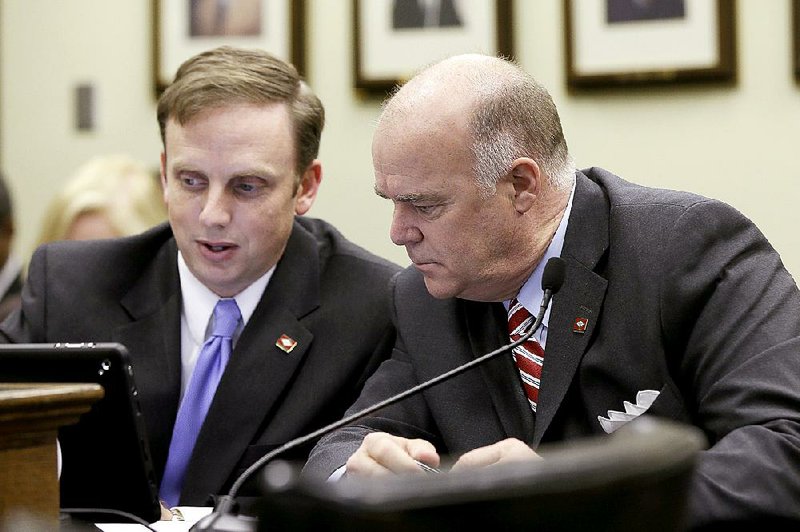An Arkansas House tax committee endorsed legislation that would restore the 2013 capital-gains tax cuts repealed by the Arkansas Legislature earlier in the session.
In a voice vote with only state Rep. Vivian Flowers, D-Pine Bluff, dissenting, the House Revenue and Taxation Committee endorsed House Bill 1402 by Rep. Matthew Shepherd, R-El Dorado.
The bill goes to the House.
It would increase the 40 percent exemption of capital gains from income taxes to 45 percent, retroactive to Feb. 1, and increase the exemption to 50 percent starting July 1, 2016.
It also would exempt from income taxes net capital gains in excess of $10 million if they are realized after Jan. 1, 2014.
Act 1488 of 2013 raised the net capital-gains exclusion from 30 percent to 50 percent, starting this tax year, and exempted capital gains received by a taxpayer in excess of $10 million, starting last tax year.
As part of Act 22 that reduces income-tax rates on Arkansans with taxable income between $21,000 and $75,000 a year, Gov. Asa Hutchinson and the Legislature allowed for the 50 percent capital-gains exclusion through the end of January and the exemption was reduced to 40 percent thereafter.
Act 22 also repealed, retroactively to Jan. 1, the income-tax exemption on capital gains exceeding $10 million.
"The original intent of the bill was to put all the capital-gains exemptions that were originally taken out earlier in the session, but ... we ultimately accomplish that goal. It is just going to take a little bit more time," Shepherd told the House tax committee.
Tax committee Chairman Joe Jett, D-Success, told the committee that the bill would phase in reducing the capital-gains exclusion from 40 percent to 50 percent by fiscal 2017 "in respect to the governor's [proposed] budget and some other moving parts that we are trying to work through on the back side to this."
HB1402 is projected to reduce state general revenue by $6 million in fiscal 2016 and $11.7 million in fiscal 2017, said Tim Leathers, deputy director of the state Department of Finance and Administration.
Flowers said the lawmakers haven't voted for "anything that will address the lowest wage earners in this state, which amounts to almost 50 percent of the people who work in this state as well as the fact that we have not come to any consensus at this point for how we are going to address pre-K [funding]."
"I just think this is premature and I think it doesn't reflect the priorities that addresses all of our constituents, especially those who are in the greatest need and who are the hardest working in many cases without the benefits and support that all of us enjoy," she said.
But Rep. Charlie Collins, R-Fayetteville, countered that "when you invest, you create business, [and] when you create business and economic growth, you create jobs."
"I would submit that the greatest potential help of these kind of tax policies is the job-creation potential for all Arkansans -- not just those who are specifically getting the capital-gains tax reduction directly, although I certainly recognize that priorities are tough decision calls and that's not the only way to help lower-income people," Collins said.
Jett said Rep. Warwick Sabin, D-Little Rock, would present legislation to the House tax committee next week to to give tax relief to some lower income-Arkansans.
In January, Hutchinson proposed a general revenue budget for fiscal 2016 that would increase state spending by $149.5 million to nearly $5.2 billion with most of the increased state funds going to the public schools, human-service programs and prisons.
Act 22 is projected to reduce state general revenue by $22.9 million in fiscal 2016 and $90.3 million in fiscal 2017, according to the finance department. The general revenue reduction in fiscal 2016 is $10 million more than Hutchinson factored into his proposed general revenue budget.
After Thursday's vote, Jett said the tax committee backed HB1202 because "this thing had overwhelming majority support in the House and in the Senate and this is what a lot of the members in the House and Senate wanted."
"But now we are going to kind of hunker back down and go back through [the Revenue Stabilization Act negotiations between legislative leaders and the governor] and see where we are at and what money's left," he said.
Hutchinson mentioned the capital-gains legislation Thursday while speaking before members of the National Federation of Independent Business in Little Rock.
"We're following it very closely and we understand that might have broad legislative support and so we're taking a look at the budget as to how that needs to be adjusted in order to accommodate that restoration of the capital-gains exclusion if it continues to pass through both chambers," Hutchinson said.
Hutchinson said his office has already found $10 million to cover the extra cost of Act 22 since it wasn't factored into his proposed budget released in January.
"If this [latest] capital-gains restoration goes through that is currently pending, then we have to find additional money there," Hutchinson said, referring to the projected revenue reduction of $6 million in fiscal 2016.
Information for this article was contributed by Claudia Lauer of the Arkansas Democrat-Gazette.
Metro on 03/20/2015

